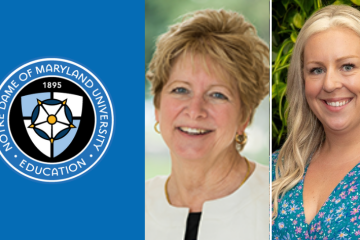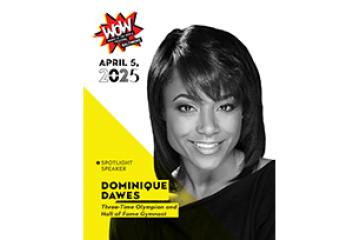Class of 2023 Spotlight: Rose Sebastian
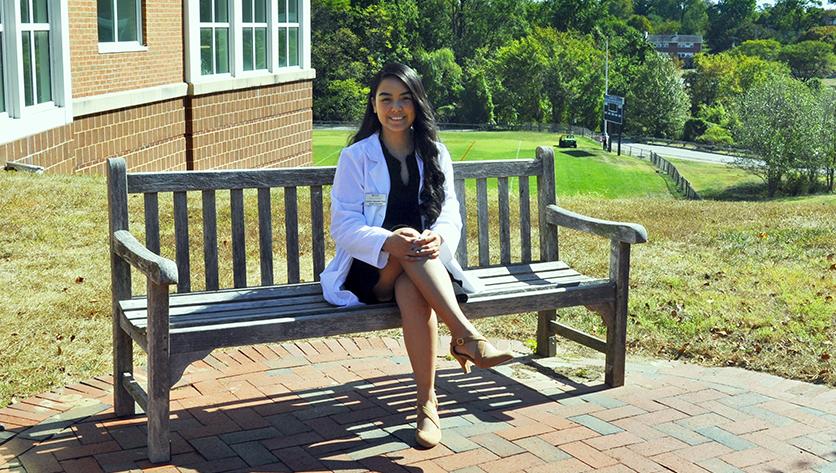
By: Erik Pedersen, Senior Communications Manager
Class of 2023 Spotlights
BALTIMORE – The 2023 Commencement Ceremony at the Baltimore Convention Center will complete a seven-year journey for Rose Sebastian ’20, D’23 at Notre Dame of Maryland University.
Sebastian first enrolled in NDMU’s 3+4 program, which allows participants to attend one fewer year of school while earning bachelor’s and Pharm.D. degrees, back in the fall of 2016. She began her pharmacy coursework three years later after earning a bachelor’s degree in biology, and she has excelled as one of the top students in Notre Dame’s School of Pharmacy during her time on campus.
Over the past four years, Sebastian was actively involved in several student organizations. She served as Operation Diabetes chair for NDMU’s American Pharmacists Association - Academy of Student Pharmacists and she was the Fighting Diabetes chair for the Student National Pharmaceutical Association. Sebastian was also involved as treasurer for Rho Chi, the pharmacy Academic Honor Society, and she was the executive officer for NDMU’s National Community Pharmacists Association.
Learn more about Sebastian’s extended NDMU experience and her future career plans in the first of several Class of 2023 spotlights leading up to commencement on May 24:
When did you decide that you wanted to become a pharmacist, and what was it that drew you to Notre Dame?
I had the opportunity to shadow a pharmacist at an independent pharmacy as an undergraduate, and that’s when it really clicked for me. My mom is actually the one who recommended Notre Dame. She mentioned that they had a seven-year program, and she told me that I should apply for it and see what happens. Once I was on campus, I worked a lot with Dr. Jennifer Kerr, my pre-pharmacy advisor. She was really helpful getting me into the 3+4 program and keeping me on track to continue onto pharmacy school at NDMU.
Did you enjoy your undergraduate years at NDMU?
I loved my undergraduate experience. I came from a very large, gender inclusive high school, so I wasn’t sure at first how I would acclimate and adapt to the environment here, but I really enjoyed it. The small class sizes were great, and all of my professors were very supportive. They always made sure that I had everything I needed to be successful.
I had a really wonderful time as an undergraduate, and that’s what made me want to remain here. There is an option to leave and go to other pharmacy schools, but with how great my undergraduate experience was, I knew that Notre Dame was the place for me.
What was it like transitioning from that undergraduate experience to pharmacy school?
The transition wasn’t as bad as I thought it was going to be. I think that the three years of undergrad really did prepare me for pharmacy school. Having to manage multiple workloads, multiple projects, and pretty intense classes as an undergraduate made it easier for me to make the transition. Plus, I already knew the environment. That definitely helped a lot.
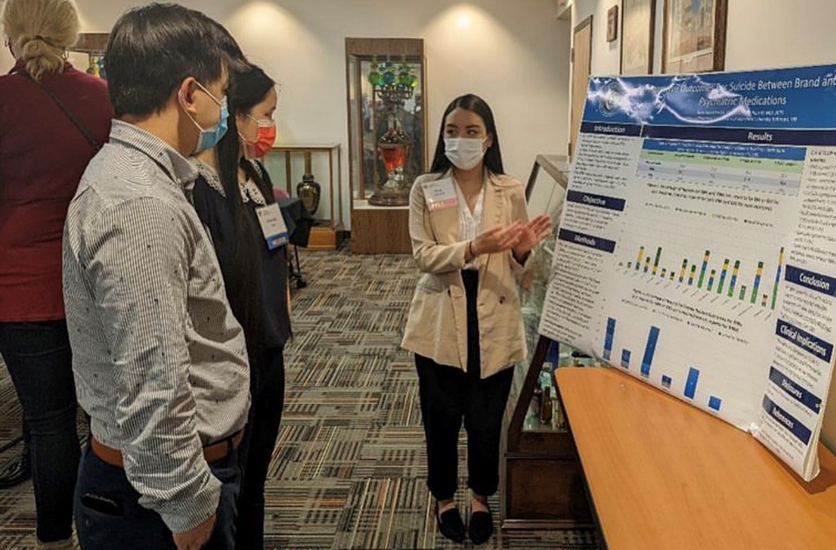
Talk about your academic experience in pharmacy school. How did the classes and any off-campus initiatives help prepare you to be successful after graduation?
For the last five years, I’ve worked at an independent pharmacy in Rosedale called Professional Pharmacy. It’s in a community setting, but there is a bit of ambulatory care involved as well. We do blood pressure monitoring, compression stocking measurements, diabetic shoes, diabetes education courses, compounding and more. There is also the general pharmacy retail aspect where I fill prescriptions and do those sorts of things.
That was my primary introduction to pharmacy outside of the classroom setting, and I think it’s really helped me prepare. My two supervisors there, Dr. Christine Lee-Wilson and Dr. Mark Hindman, they really push me to question a lot of the prescriptions we get, to reach out to doctors and make recommendations, and to always build on my skills. Every day that I go in to work, they are quizzing me on some sort of medication to keep up all of the knowledge that I’ve gained in pharmacy school.
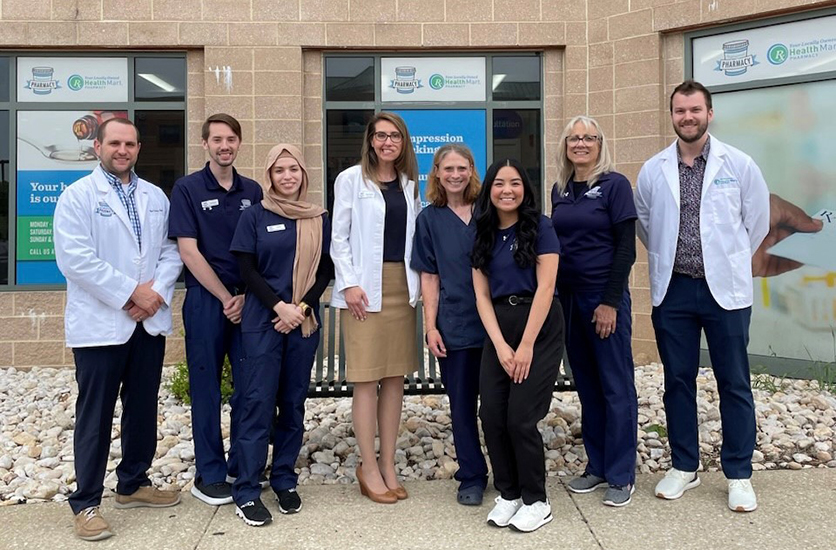
On campus, I’ve had a lot of different pharmacotherapeutic courses where we learn about different disease states and the science aspect of it – like pathophysiology, mechanism of action and drugs – and then the clinical aspect. How to know what medicine is appropriate for a patient, how to look at drug interactions, dosing frequency, that sort of thing. When I went on my pharmacy practice rotations, and when I was at work, I was able to take all of that information I had learned in pharmacy school and apply it to real patients.
What are your current plans for after graduation?
I am pursuing a residency at the Baltimore VA Medical Center. At first, I thought I was going to stay at the independent pharmacy I was working at, but that started to change last October when I had my ambulatory care rotation with Dr. Alyssia Dyett. She is an NDMU alum who now works as a professor, and I thought her rotation was very interesting because it was half academia and half ambulatory care. She speaks to patients about their different medications, she makes recommendations to providers, and she’s teaching the future generations.
I knew that I wanted to pursue academia and eventually become a professor, hopefully here at Notre Dame, to give back to future generations of pharmacists. I told Dr. Dyett during the rotation that I really liked what she did and wanted to be like her, and she told me what I needed to do to get to her position. One of those requirements was to go into residency.
The VA is well-known for their ambulatory care rotations, where you focus on heart failure, anticoagulation, and dyslipidemia. For me it was a no-brainer to pursue that residency, and I was fortunate enough to be selected.
What is a top highlight from your Notre Dame experience?
I would say my favorite thing about Notre Dame is the professors. They really prioritize helping students learn and achieve their goals. Even as an undergrad, I could always run to Dr. Kerr’s office when I was struggling, not feeling ready for pharmacy school, and she would be there to talk me through it. I always felt safe, not judged, and that I could ask them anything.
Even now in pharmacy school, I was worried because I thought, pharmacy school is so tough, the pace is so fast, it might be hard to keep up with everything going on, but our professors are willing to work with us. They will hold extra review sessions, and they will sometimes move exams if we’re feeling too overwhelmed. I can really tell that the professors go above and beyond for the students to ensure that they’re learning and achieving all of the goals that they have for themselves. That’s definitely my favorite part of NDMU – all of the professors that I’ve had the opportunity to learn from.
Do you have any message you’d like to share with pharmacy students who are still working their way through the program?
Use all the resources that are available to you. Especially in the first year, it can be very intimidating to go talk to professors, but they are there to help you learn. It’s also not just the professors – the deans are there for you as well. Dr. Matt Shimoda, Dr. Sharon Park, everyone is always willing to listen, and they always have an open door for you to walk in and ask questions or voice concerns about a particular course.
The upperclassmen are also a great resource. In my first year of pharmacy school, we were paired with a second-year buddy that we could talk to whenever we want. They were all so helpful in making sure that the transition was smooth. Even if it feels intimidating to reach out, nobody is going to say no to you. It gets tough as you go through pharmacy school – not being alone through the process and having that support system definitely helped me a lot.
Established in 1895, Notre Dame of Maryland University (NDMU) is a private, Catholic institution in Baltimore, Maryland, with the mission to educate leaders to transform the world. Notre Dame has been named one of the best "Regional Universities North" by U.S. News & World Report.


